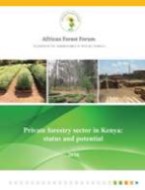This study provides information to support catalysing the emergence of organized private sector in forestry in Kenya, through promotion of promising public private partnership (PPP) approaches for sustainable forest management and enhanced livelihoods including gender considerations.
The projection on supply and demand of products in the country indicates that the demand for various forest products is fast growing as compared to supply potential from the various sector actors. MENR (2013) study found that Kenya has a wood supply potential of 31.4 million m3 against a national demand of 41.7 million m3 hence a current deficit of 10.3 million m3. Timber, poles, fire wood and charcoal supply stands at 7,363,414m3, 3,028,907m3, 13,654,022m3 and 7,358,717m3 while demand stands at 5,262,624m3, 1,409,482m3, 18,702,748m3 and 16,325,810m3 respectively. MENR (2013) forecast for a 20 year period 2010-2032 indicates that the total forest product supplies will increase by 20% and overall demand by 21.6% which signifies a gradually increasing deficit.
Therefore entry of private sector with desired financial capital and operational efficiency expertise will compliment public and smallholder actors in expansion of the sector forest product supply capacity and contribution to overall national economic development

